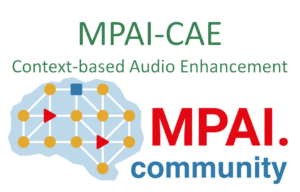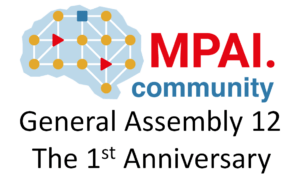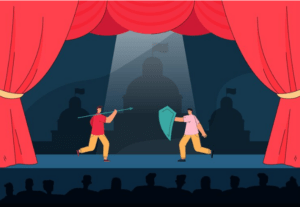Geneva, Switzerland – 20 March 2024. MPAI – Moving Picture, Audio and Data Coding by Artificial Intelligence – the international, non-profit, and unaffiliated organisation developing AI-based data coding standards has concluded its 42nd General Assembly (MPAI-42) approving the release of Reference Software using Neural Network Watermarking for Generative AI applications.
The new V1.1 version of the Neural Network Watermarking (MPAI-NNW) Reference Software includes an implementation of the AIF Framework and of an AI Workflow enabling a user to make queries that include a text and an image and obtain a vocal response. This inference is watermarked, to enable the issuer of the query to ascertain that the response they receive is from the intended source. The Software will be presented online on the 16th of April at 15 UTC. Register at https://us06web.zoom.us/meeting/register/tZ0udeutqT0vHdBh1DLiUxoRr59cUs7iQzzN.
Presentations and video recordings of all MPAI standards are available:
| AI Framework (MPAI-AIF) | ppt | YT | nYT |
| Context-based Audio Enhancement (MPAI-CAE) | ppt | YT | nYT |
| Connected Autonomous Vehicle (MPAI-CAV) – Architecture | ppt | YT | nYT |
| Compression and Understanding of Industrial Data (MPAI-CUI) | ppt | YT | nYT |
| Governance of the MPAI Ecosystem (MPAI-GME) | ppt | YT | nYT |
| Human and Machine Communication (MPAI-HMC) | ppt | YT | nYT |
| Multimodal Conversation (MPAI-MMC) | ppt | YT | nYT |
| MPAI Metaverse Model (MPAI-MMM) – Architecture | ppt | YT | nYT |
| Neural Network Watermarking MPAI-NNW) | ppt | YT | nYT |
| Object and Scene Description (MPAI-OSD) | ppt | YT | nYT |
| Portable Avatar Format (MPAI-PAF) | ppt | YT | nYT |
MPAI is continuing its work plan that involving the following activities:
- AI Framework (MPAI-AIF): developing open-source applications based on the AI Framework.
- AI for Health (MPAI-AIH): developing the specification of a system enabling clients to improve models processing health data and federated learning to share the training.
- Context-based Audio Enhancement (CAE-DC): preparing new projects.
- Connected Autonomous Vehicle (MPAI-CAV): Functional Requirements of the data used by the MPIA-CAV – Architecture standard.
- Compression and Understanding of Industrial Data (MPAI-CUI): preparation for an extension to existing standard that includes support for more corporate risks.
- End-to-End Video Coding (MPAI-EEV): video coding using AI-based End-to-End Video coding.
- AI-Enhanced Video Coding (MPAI-EVC). video coding with AI tools added to existing tools.
- Human and Machine Communication (MPAI-HMC): developing reference software.
- Multimodal Conversation (MPAI-MMC): developing reference software and conformance testing and exploring new areas.
- MPAI Metaverse Model (MPAI-MMM): developing reference software specification and identifying metaverse technologies requiring standards.
- Neural Network Watermarking (MPAI-NNW): reference software for enhanced applications.
- Portable Avatar Format (MPAI-PAF): reference software, conformance testing and new areas.
- Server-based Predictive Multiplayer Gaming (MPAI-SPG): technical report on mitigation of data loss and cheating.
- XR Venues (MPAI-XRV): development of the standard.
Legal entities and representatives of academic departments supporting the MPAI mission and able to contribute to the development of standards for the efficient use of data can become MPAI members.
Please visit the MPAI website, contact the MPAI secretariat for specific information, subscribe to the MPAI Newsletter and follow MPAI on social media: LinkedIn, Twitter, Facebook, Instagram, and YouTube.




